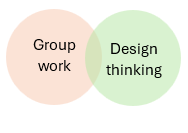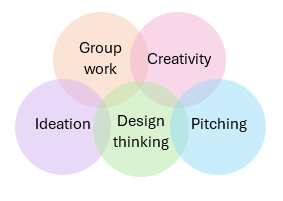How to develop a business plan refers to the process starting with the business model and describing all the implementation stages leading from Technical Domain (feasibility, performance) to Economic Domain (Value, Price, Profit).
Bachelor

1ZM170 - Innovation & entrepreneurship study – 7.5 ECTs – Q1
Introduction to concepts for sustainable business modelling, such as customer discovery and validation, minimum viable product, design thinking, business modelling, sales strategy, operations, financial forecasting, and sustainability impact. Introduction to business modelling tools such as business model canvas, customer journey, empathy map, business model metrics, value network. In the following step a business plan will be developed in terms of time and activities to implement it.
Master

1BM05 – Business process management – 5 ECTs – Q2
Instead of taking an organization's functional decomposition as a starting point to manage the efficiency and effectiveness of operations, business process management focuses on the business processes that cut right through different departments. A business process can be seen as a structured set of activities designed to produce a specified output for a particular customer. As such, an effective and efficient business process is a particularly valuable asset for companies to attract and please its customers.

1ZM160 – Innovation and entrepreneurship study – 5 ECTs – Q1
The course is organized group work, where you will work in teams of to prepare a group-report to address a business challenge based on a case offered by a company and the team-dynamics related to that process. You will be interacting with a company, working on a robust business analysis and analyzing a tech-based innovation.

1BM05 – Business process management – 5 ECTs – Q2
Instead of taking an organization's functional decomposition as a starting point to manage the efficiency and effectiveness of operations, business process management focuses on the business processes that cut right through different departments. A business process can be seen as a structured set of activities designed to produce a specified output for a particular customer. As such, an effective and efficient business process is a particularly valuable asset for companies to attract and please its customers.
PhD/EngD

1BM08 – Business process management – 4 ECTs
Instead of taking an organization's functional decomposition as a starting point to manage the efficiency and effectiveness of operations, business process management focuses on the business processes that cut right through different departments. A business process can be seen as a structured set of activities designed to produce a specified output for a particular customer. As such, an effective and efficient business process is a particularly valuable asset for companies to attract and please its customers.